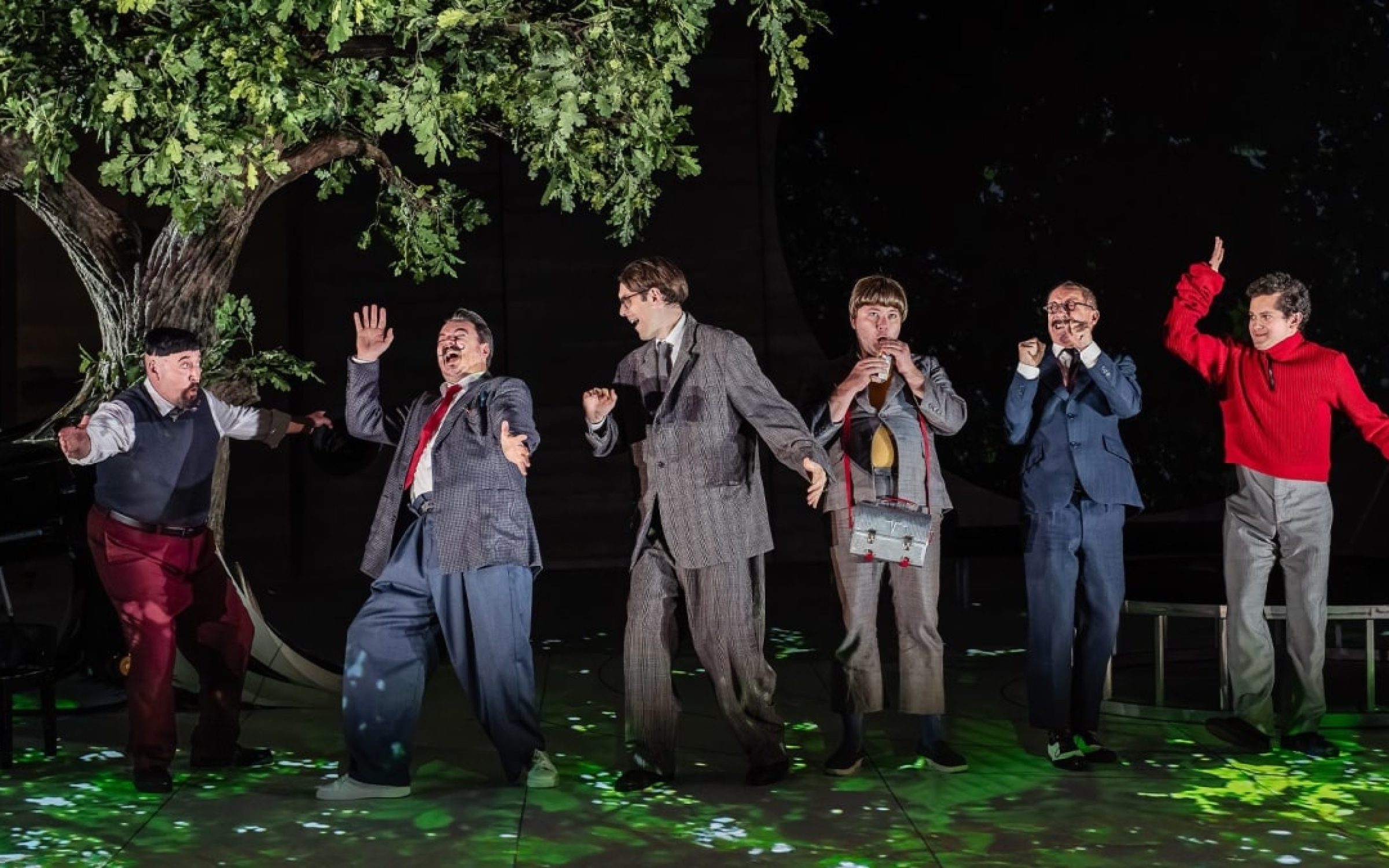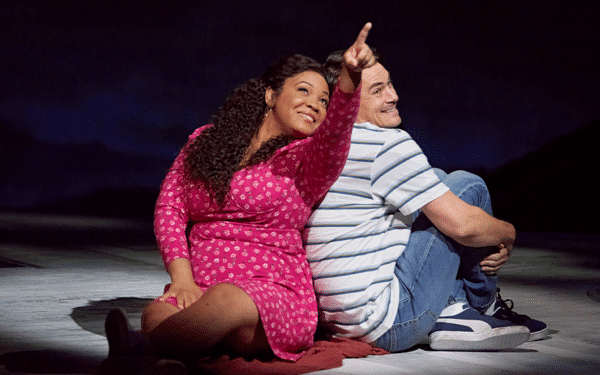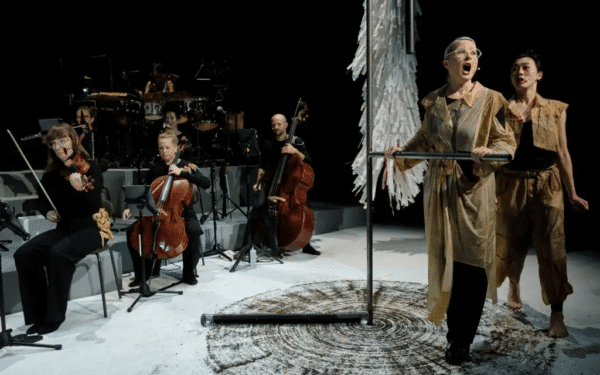Nowhere transforms the English countryside into fairyland better than Garsington Opera stage. No opera is more atmospheric than Benjamin Britten’s A Midsummer Night’s Dream.
In dampish Oxfordshire Wormsley estate the planets were aligned, all set fair, the heavens no longer drizzling but smiling, gals in the smoky mobile kitchen serving mean pork scratching sliders.
The industrial style opera house – think Meccano meets Ikea – with glass walls open to daylight, features a raked stage and no proscenium arch. This is Globe theatre style opera-in-the round. Well, almost. There is an orchestra between players and audience. But that cannot diminish the sense of involvement.
There are no offstage secrets at fish tank opera. Imminent performers can be seen looming along the corridors parallel with the auditorium. Except when entrances and exits are from below stage. Which they frequently are in this fast-moving Netia Jones directed production.
Britten wrote A Midsummer Night’s Dream in 1960. His partner, Peter Pears wrote the libretto. It is a precis of the Shakespeare play, starting at Act II, which grounds us firmly in fairyland, not the world of mortals.
Although lines are cut – singing takes much longer than speaking – Pears did not interfere with Shakespeare’s words, unless to accommodate some particularly awkward musical phrase. But mostly, it is Britten who accommodated to the libretto rather than the converse.
The result is that the detail of this opera plot is familiar to even every third form dullard who has done nothing more than grind through the text in boredom. Britten also makes much use of recitative form, so the English language (obviously) is accessible to the audience. No need to avert eyes to supertitles.
I shall not dwell on the action. A full synopsis is available here for those unfamiliar with the plot. Garsington does not publish one online.
Settling into the steeply raked seats – there are no line-of-sight obstructions, even big heads – the audience confronts a raked, silver and black themed stage, embellished with a tree stage-right that seemed to have forced its way through the splintered floor. A number of allusions to the stars and constellations – a large orrery – and a dark, flat circular screen to facilitate projections catch the eye.
A grand piano seemed to have suffered an unfortunate forest path traffic accident with the tree. Perhaps at the hands of an out of control, over the limit pianist. Or, a former virtuoso who had flunked a dementia test and whose wife still refused to tell him to hand over the keys to the piano lid.
It was canted at 45 degrees against the tree and, apart from having its keys fingered casually by Oberon, served no useful musical purpose at all. It did, however, afford handy cover for the trapdoor which allowed under stage entrances and exits to the tree for Puck, the children’s fairy chorus et al. Puck was a particularly agile sprite.
The open glass walls of the theatre create an illusion we are connected to the woodland beyond. The audience has not gone to the theatre at all. Merely stumbled across an opera in a forest clearing and decided to settle down to watch.
That the glade affords handy parking, excellent catering, picnic marquees, a Garsington shop, champagne bar overlooking a delightful lake, the best public conveniences of any country house opera venue I have frequented this season, and is two minutes off the M40 dissolve rapidly in the mind.
We are there alongside Shakespeare’s fairy band, the Athenian aristos all in love with the wrong person and the rude mechanicals setting up a rubbish play – Pyramus and Thisbe – for Theseus’, Duke of Athens, wedding. Shakespeare wrote an ensemble piece. Britten’s opera narrative is more driven by the magical, fairy world actors.
The opening is ethereal. It promises the audience a magical mystery tour. Slow, glissando strings open a conversation taken up by the rest of the orchestra, gradually speeding up, setting an atmosphere of deepening mystery, until joined by – what’s this? -the unworldly celeste, the 19th century keyboard instrument that plays bells rather than whacks strings. Layman’s definition.
A shout out for Fran Hills, maestra of celeste and harpsichord. Hills is a freelance repetiteur who ranges across the UK and Europe, taking her skills to unusual venues, The Clink restaurant in Brixton prison and playing for Westside Story and Guys and Dolls with Pimlico Opera for Wandsworth inmates.
There is no doubt this is fairyland, and that it is the conflict between Oberon and Titania over custody of the changeling boy that will drive the action. Humans – even Athenian aristos – play second fiddle.
Oberon is sung by Iestyn Davies, counter tenor, fresh from his triumph as Handel’s Orlando at London Barbican. Occasionally wearing what appeared to a wolf’s head for no apparent dramatic reason, Davies cut a relaxed, sometimes swaggering figure as Oberon. His countertenor is clear, direct and perfect for commanding Puck and his retinue.
Where the command-thing breaks down is with his troublesome queen Titania, sung by soprano Lucy Crowe. Crowe is currently a welcome fixture on opera stages and concert platforms, at the top of her considerable game. Normally this requires only a terrific voice – that she has – and great acting ability. But in this production she added the trick of lying down on a camp bed stock-still with an Ass, the drug deluded Bottom, for what seemed ages. Tough direction.
Puck, a spoken role, was acrobatically spellbinding. Jerone Marsh-Reid, actor/dancer was spectacularly choreographed by Rebecca Meltzer, who made best use of his ability to execute mind-whirling acrobatics back and forth across stage, before bounding up his piano and down his tree-hole. He truly put a girdle round the earth in 40 minutes.
From the rest of an excellent cast Richard Burkhard, the Anglo-Swiss baritone, Bottom, deserves a plug. He got the pushy, know-it-all, ‘I can fix your plumbing’, ‘now, about that lion’, annoying caricature neighbour to perfection.
Douglas Boyd, Garsington’s artistic director, and the Philharmonia Orchestra, put all the subtleties of Britten’s score on display, from creating that ethereal opening atmosphere, through navigating Britten’s sound worlds as the action unfolds, and on to the braying music accompanying Bottom’s antics.
Hardly any Britten work is complete without a children’s chorus. At their Aldeburgh home Britten and Pears made great efforts to promote musical education and involve the local community. Even to the extent of putting them in the dock for intolerance as the citizens of The Borough in Peter Grimes.
Garsington Opera Youth Company spawned the children’s chorus that opens the opera, gathering one by one and singing Over hill, over dale until Titania’s Queen of the Night high note entry sets the context for her furioso treatment of husband, Oberon.
The Youth Company has produced some rare talents, unafraid to take on mainstage challenges. These are no shuffling kids hoping their parents will clap their school-play performance no matter how ineptly executed. Every single one is a thoroughbred professional.
In his A Midsummer Night’s Dream Britten tips his hat to fellow English composer, Henry Purcell. Four centuries after Purcell wrote The Fairy Queen for Queen Elizabeth I, the original opera of Shakespeare’s play, Britten had decided on a reboot, acknowledging his predecessor. Much as a modern-day Land Rover Defender is proud to show the roots of its 1948 original through its coolly sculpted 21st century coachwork.
No surprise. In another opera, Gloriana, commissioned in time to mark Queen Elizabeth II’s coronation in 1953, Britten saw himself as Purcell’s successor, marking the opening of another Elizabethan age. Panned by critics at the time, I think Gloriana is a ‘must’ for anyone interested in Britten’s work.
There is another ‘spot the influencer’ moment when the invasion theme from Shostakovich’s Leningrad Symphony rings out loud and clear.
The acid test. Unusually, I was accompanied by She Who Dislikes Opera, my ‘I hope there are two intervals’, long-suffering wife. There were two intervals. She loved Garsington – the production, the venue, but ‘not the music’. For many this would be a fatal failing. A bit like enjoying a Gordon Ramsay restaurant, except for the food. Bad luck, Benjie.
I am, however, instructed that Garsington be a priority for 2025. Donizetti’s L’elisir d’amore, Tchaikovsky’s The Queen of Spades, Handel’s Rodelinda and Beethoven’s Fidelio will be on offer. Perhaps the Fidelio prisoners will emerge into the light from under that piano. Whatever, I shall be happy to comply.
Write to us with your comments to be considered for publication at letters@reaction.life





